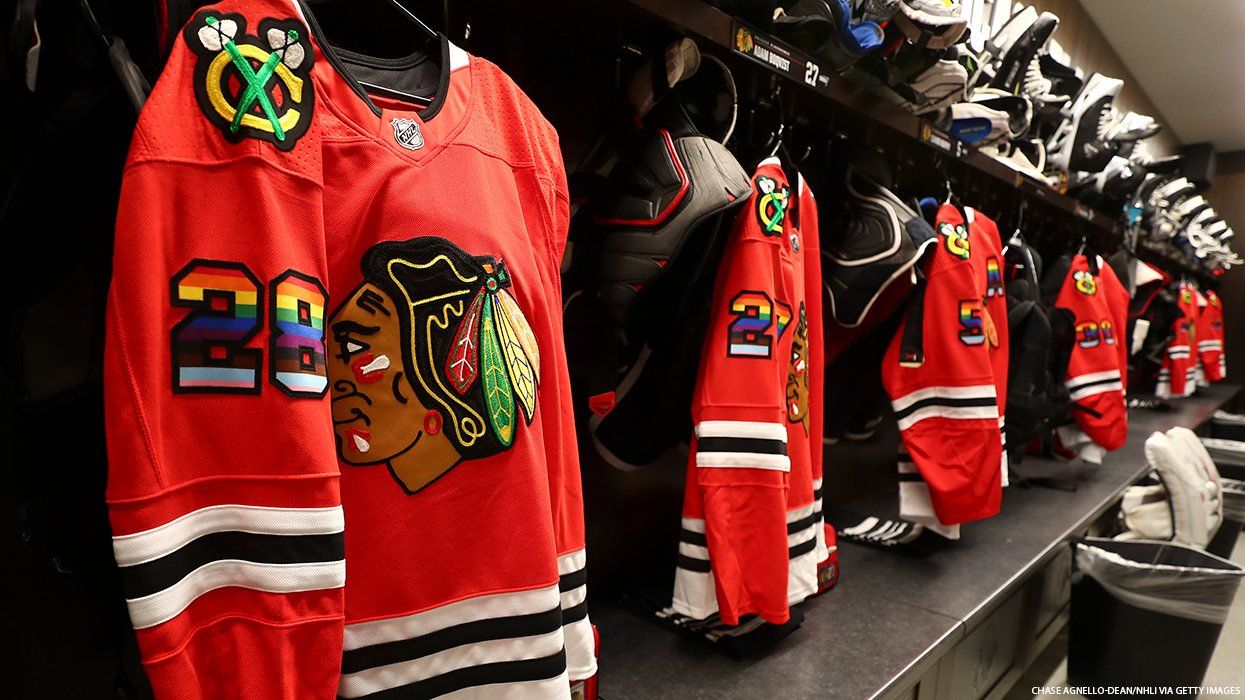The Chicago Blackhawks have announced that they will not be wearing Pride jerseys during their annual LGBTQ+ celebration on Sunday, citing safety concerns for Russian players.
In December, Russian President Vladimir Putin passed a law banning LGBTQ+ "propaganda," which makes it illegal to “praise” LGBTQ+ relationships, publicly express non-heterosexual orientations, or suggest that they are “normal.”
In the National Hockey League, 5 percent of players this season are Russian. In the months since Putin's law, several teams have opted not to wear their pride jerseys, including the New York Rangers, New York Islanders, and Minnesota Wild. The Chicago Blackhawks have become the latest, announcing ahead of their Sunday game that the pride jerseys would not be worn.
"We do not condone anti-LGBTQIA+ rhetoric, and we stand firmly with the community," the team's statement in the Chicago Sun-Times said. "While we know game-day celebrations like these are an important way we can use our platform to bring visibility, it is the work we do together 365 days a year that can create true impact in ensuring all of our colleagues, fans and communities feel welcomed and safe within our sport.”
Breaking down the NHL pride ban

According to the Sun-Times, the decision was ultimately made to protect the Russian players on the team. Defenseman Nikita Zaitsev is from Russia, whereas forward Philipp Kurashev and goaltender Anton Khudobin both have family in the country. The Blackhawks reportedly believed that donning pride jerseys would put them and their relatives at risk.
Despite the homophobic outcome of the Blackhawks' decision, the safety of Russian players is a legitimate concern within the NHL. In the 2020-2021 season, left-wing of the New York Rangers Artemi Panarin became the only NHL player to publicly oppose Putin when he supported Russian opposition leader Alexei Navalny. Less than a month later, he was accused of beating a woman ten years earlier when he played in the Kontinental Hockey League in Russia.
The allegations came from former NHL player Andrei Nazarov, who was Panarin’s coach during the time of the supposed incident, and who staunchly supports the Russian government and Putin. Panarin was eventually cleared of the accusations, with the Rangers releasing a statement calling them an "intimidation tactic" in response to his political statements.
The Russian president is reportedly a big hockey fan, and players who win his favor often get government jobs once they retire and return to the country. While Panarin was targeted due to his remarks on Putin, no players have yet been challenged for donning pride jerseys — which many have worn, even after the passing of Russia's new law.
The Dallas Stars, Los Angeles Kings, and San Jose Sharks all have Russian-born players, all of whom wore pride jerseys alongside their teammates during pride nights. Philadelphia Flyers defenseman Ivan Provorov has been the only Russian player who publicly refused to wear one, and did not cite safety concerns, but rather his Christian faith.
The Minnesota Wild also did not explicitly cite Russia when management opted for the team not to wear pride jerseys, but the team's star player, Kirill Kaprizov, is Russian-born, and was recently already the subject of legal troubles in the country this past summer for allegedly evading mandatory military service.
Russia's law is particularly vague, which could be prompting NHL officials to air on the side of caution, but in the case of the Blackhawks, it seems particularly misguided given that the team hosted a Ukrainian Heritage night on March 4. The position took an explicit stance against Russia's invasion of Ukraine — a stance directly critical of Russia, as opposed to Pride's more generalized "hockey is for everyone" slogan.
The Blackhawks' decision to not wear pride jerseys also seemingly went against the direct will of the players, even those who are Russian. Alternate captain Connor Murphy previously spoke about players choosing not to wear pride jerseys, telling the Athletic two weeks ago that Chicago's jerseys would be worn by all of their players.
“I don’t think we have anyone, that I know of, that wouldn’t support [pride,]” Murphy said. “It was surprising to see that stuff came up this year. We’ve been doing it for so many years, so it’s not like it’s a new subject. ... It is a bit disappointing. It seems like we have so many other nights, and nobody raises any issues."
For many LGBTQ+ hockey fans, teams citing Russia as the reason behind nixing pride jerseys feels disingenuous. With growing anti-LGBTQ+ sentiment within the United States, using Putin's laws as an excuse feels just like that — an excuse. While some Russian players may have concerns for their safety, those on the Rangers, Wild, and now Blackhawks have not been given that choice.
"Hockey is about inclusion, about growing the community and the game," Murphy continued in his statement. "I don’t see why anyone would have a need to feel like they don’t support a certain group. If it’s about the game and about bringing everyone together and about equality, everyone should always be supportive of that.”
- Does The NHL Support Transgender Athletes? Team Trans Weighs In ›
- NHL Pride Jerseys Abandoned by Teams After Conservative Pushback ›
- This City Now Has the Most LGBTQ+ Council Members in US History | AdvocateChannel.com ›
- NHL Bans Pride Tape, Stops Players From Showing LGBTQ+ Support At Games ›
- Chicago Blackhawks Sued by Former Player Over Sexual Assault ›
- The NHL Demonstrates Why LGBTQ+ Players Stay in the Closet ›


















































